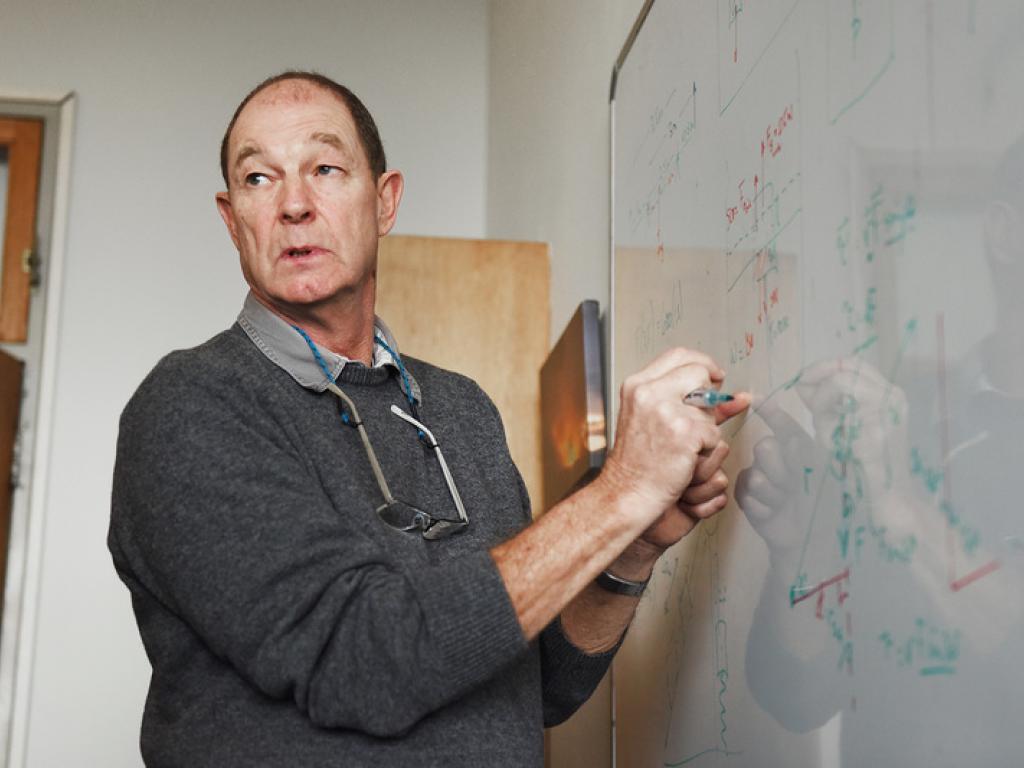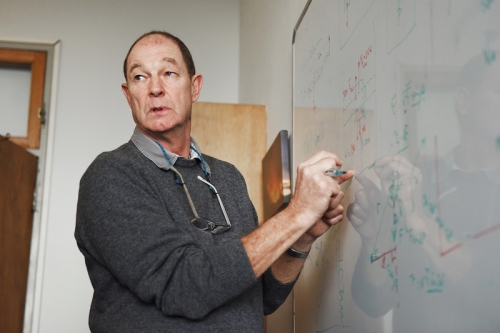Distinguished physics teacher leaves his mark


At work: Gregor Leigh, physics lecturer and one of four new Distinguished Teacher Award winners.
Relaxed, irreverent, interactive, engaging. That’s how physics lecturer Gregor Leigh describes his teaching style. Leigh is one of four new recipients of the Distinguished Teacher Award (DTA), a highly prized accolade at the University of Cape Town (UCT). The former high-school maths and science teacher and technikon lecturer shared his thoughts with Helen Swingler.
What do you teach and to whom?
From teaching physics, chemistry, maths and English at secondary level, I’ve become a one-trick pony at UCT, teaching only first-year physics to all the engineering students.
How large are your classes?
I convene the two Physics for Engineering modules, starting with around 650 students, but only 300 students fit into James 3A [classroom] at a time – hence the need to lecture the same material to two classes back-to-back.
What do you love most (and least) about working with students?
It took me several years to fully appreciate just how special engineering students are. Despite my own dismal, lackadaisical student record here, I thought that all UCT students were as enthusiastic, engaged, curious, motivated, appreciative and just plain gung-ho as the first-year engineers I encountered when I started part-time lecturing here. Perhaps it’s their cohesiveness as a group (an esprit de corps if you will), their appreciation of the importance of physics for their profession and their natural (if sometimes unrealised or unpolished) ability that has made my 21 years of contact with them a real treat. On another level, working with first-years has helped to keep me, if not completely in tune with the younger generation, at least in touch with them. I learn things about them as well as from them, and I like to think this has kept me young at heart and malleable.
“I learn things about them as well as from them, and I like to think this has kept me young at heart and malleable.”
What makes a good teacher?
The ability to listen carefully to what students are really asking or needing, and to know how to fetch them from there to a proper understanding of the concepts, [and] in the process getting them to see the bigger, generalised picture. A good command of the language of instruction. In the early days [when I was teaching] at Cape Tech I was required to lecture in Afrikaans, and while I am fluent in the language, I felt inadequate in not being able to explain something in three or more different ways. As a friend [said], teaching is what you do when your student says for the third time: “But I still don’t understand!”
How would you describe your teaching style?
Relaxed, irreverent, interactive, engaging. Besides encouraging questions, I make as much use as possible of what are known as ConcepTests: multiple-choice questions sprinkled generously throughout my PowerPoint presentations. In earlier years we issued students with slips of coloured voting paper, but nowadays they respond via their cellphones or laptops. I immediately see a histogram of responses, quickly spotting where further discussion between themselves or perhaps further elucidation from me is required.
What are the main challenges of teaching physics at university level?
Diversity on so many levels: preparedness for tertiary education, language skills, mathematical skills, and, most important of all, degree of self-confidence and sense of belonging. In my first few lectures I explicitly address the phenomenon known as the Imposter Syndrome, but it can take first-year students, even those from local, privileged secondary schools, a whole semester to settle in and believe in their ability, especially in the face of first-time-ever setbacks and failures. Underprepared students from rural areas are often completely overwhelmed, and I rue my ongoing inability (and lack of opportunity) to ameliorate their plight.
“Teaching is what you do when your student says for the third time: ‘But I still don’t understand!’ ”
How has your relationship with your students, teaching style or subject matter changed over time?
The content of the classical mechanical physics taught at first-year level hasn’t changed much in 400 years, but the methodology certainly has. In my day, students were expected to develop problem-solving skills pretty much by osmosis while watching lecturers doing worked examples on the board. In line with modern physics education research, my own MSc thesis showed the benefit of explicit training in multi-representational problem solving, even among “weak” or underprepared and unmotivated students at another tertiary institution.
With these tools at their disposal even students formerly wary of physics begin to enjoy it and see the fundamental rightness of it, and their appreciation and gratitude shine through. Their marks improve, but more importantly, so do their emotional attitudes towards the subject. Their expectations become more appropriate and their work ethic improves. This is what has got me out of bed for first-period lectures these past two decades!
What is the importance of this kind of recognition (DTA) to teaching staff?
We’re all human, but my experience is that teachers are even more so. We’re often more unsure, more insecure, about what we’ve actually achieved in the classroom than many other people whose successes can be measured quantitatively on a balance sheet, or by the number of storeys built, or clients processed. Whatever definition you use for teaching, or whatever form it takes, for those of us who are passionate about engaging, awakening and motivating students to learn (and there are many of us at this university), the recognition of our efforts is an essential part of keeping us on track, of reassuring us that we’re ‘doing the right thing’.
This is never more important than in subjects at risk (like physics), where despite the best efforts of the teachers, large numbers of students will fail for reasons other than poor or insufficient support/teaching. From all the feedback I’ve had from my UCT engineering students over the years, and particularly the response to the momentous ‘last lecture’ I delivered at the end of last year, I should have been sufficiently reassured, but the DTA takes it to a new, university-wide level, and I am greatly honoured by and immensely proud of the award.
Story by Helen Swingler
Photo by Robyn Walker
